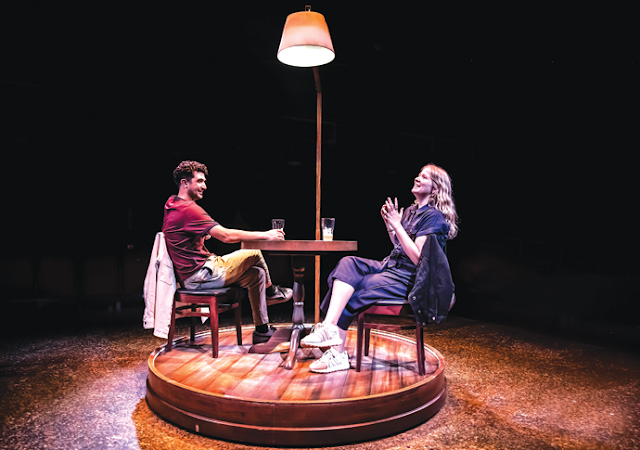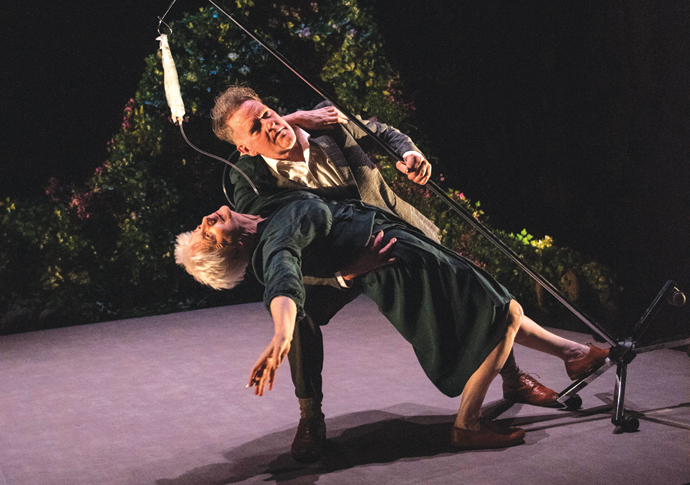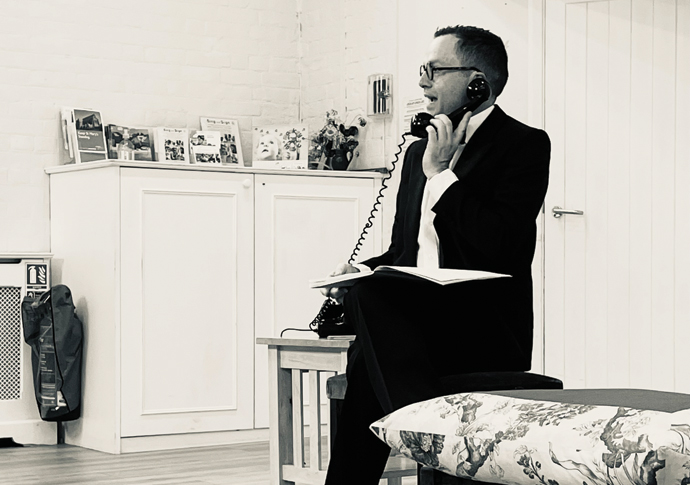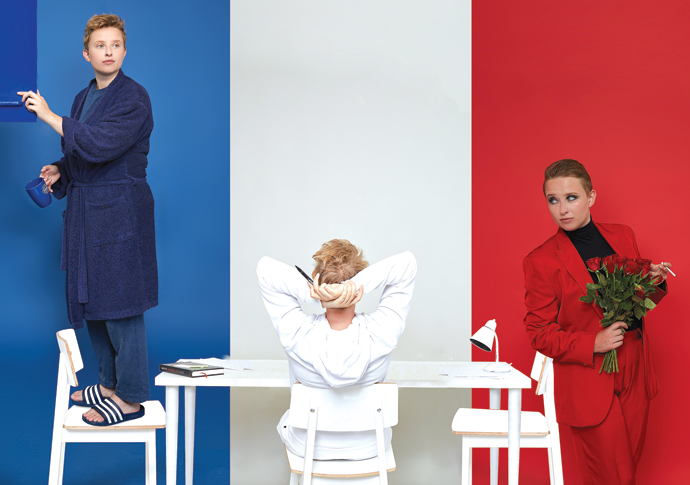Theatre & Comedy review - Edinburgh Fringe Festival
THE Edinburgh Festival Fringe takes place every August. This year, 288 venues hosted a terrific selection of work. It was wonderful to catch shows I’d missed earlier in the year, discover companies like Dublin-based Junk Ensemble and preview several performers who are coming to London in the autumn.
In Miriam Battye’s new play, Strategic Love Play (Summerhall, 3.5 stars), a couple meet in a pub on a first date. Jenny (Letty Thomas) tries to goad Adam (Archie Backhouse) into saying what he really thinks without worrying about the consequences. She’s uncomfortably straight-talking, he’s gauche. Pushed by Jenny, he tells her he doesn’t find her hot. She challenges him, but they both stay, buying rounds waiting for the spark to ignite.
The pair cover all the permutations of a relationship in just 70 minutes from the discovery of what makes each other tick to the petty bickering that ensues when the sheen wears off. Will they make it as a couple? You can catch this terrific two-hander Upstairs at Soho Theatre from Sept 6-23.
Supported by New Diorama Theatre, It’s a Motherf**king Pleasure (Underbelly, 4 stars) proves a riotous hour of comedy. Disability-led theatre company FlawBored have created a series of sketches (co-written with director Josh Roche) that explore identity politics and highlight current anxieties about being seen as ableist. It features three performers, Samuel Brewer, Aarian Mehrabani and Chloe Palmer, two of whom are visually impaired.
 It’s all carefully engineered – dialogue is captioned and scenes are audio-described. Brewer plays a talent-manager at a PR agency that has recently been accused of ableism. In a bid to limit the negative fallout he hires a blind influencer (Mehrabani). Palmer is the over-anxious human resources manager who is determined to do and say the right thing. Some jokes don’t land, but this is a delightfully irreverent satire and I look forward to seeing what this inventive company tackle next.
It’s all carefully engineered – dialogue is captioned and scenes are audio-described. Brewer plays a talent-manager at a PR agency that has recently been accused of ableism. In a bid to limit the negative fallout he hires a blind influencer (Mehrabani). Palmer is the over-anxious human resources manager who is determined to do and say the right thing. Some jokes don’t land, but this is a delightfully irreverent satire and I look forward to seeing what this inventive company tackle next.
Dances Like a Bomb (Zoo, Southside, 4 stars) is the latest work by award-winning dance innovators Junk Ensemble. Performed by acclaimed actor Mikel Murfi and leading Irish dance artist Finola Cronin, the 60-minute piece celebrates the strength and beauty of mature bodies. The pair push and pull at each other, finding sagging skin, bat wings and “flob”. Like a couple of clowns from a Samuel Beckett play they wait patiently, play games to pass the time and dance with and around each other. I loved the manic, bittersweet enacting of “ways to die” which include neglect, gunshot, disembowelment, assisted suicide and a car crash. Another memorable sequence involves a saline drip connected to a pole. Choreographed and directed by twin sisters Jessica and Megan Kennedy, and blending arresting imagery, movement, text and music, Dances Like a Bomb is a joyous homage to the ageing body and a tender exploration of the familiarity of a lifelong relationship.
In 2020 award-winning comedian Ben Target paused his career to become the live-in carer for his adopted uncle Lorenzo, a former architect and an irascible, playful octogenarian from Hong Kong. He created a show, Lorenzo (Summerhall, 3.5 stars), from this time. Through lively storytelling and live carpentry Target describes their daily schedules, the memories they share, the bad days and their mutual love for one another. Lorenzo sends Target on a quest to find a brand of coffee that was discontinued decades previously. On another occasion, in the middle of a job interview, Lorenzo sends him multiple urgent texts about an aubergine. Despite the frustrations, Target tells us Lorenzo was the only adult he felt safe around. An affectionate, funny portrait of an inter-generational friendship. Poignantly, Target worked with the acclaimed director Adam Brace, who died earlier this year. His show is a fine tribute to both Lorenzo and Brace and will be at Soho Upstairs from Sept 27-Oct 14.
Andrew O’Hagan’s one-act play, The Ballad of Truman Capote (the Space@Niddry St, 3 stars) gives us a glimpse into the life of the notorious American writer. Set in New York’s Plaza Hotel in 1966, Capote is about to throw a masquerade ball for his friend the Washington Post publisher Katharine Graham. As the rich and famous congregate downstairs, Capote retires to his suite to drink martinis. O’Hagan imagines his meditations on the various celebrities. While waiting to join the throng, Capote also recalls his Alabama childhood, early love of writing, friendship with Harper Lee and the success of his seminal book In Cold Blood. Patrick Moy perfectly captures Capote’s distinctive childlike voice and derisive laugh. There’s little tension and few surprises, but we pass an enjoyable hour in the company of this iconic figure. Londoner Callum Hughes greets us with his acoustic guitar, a pint of non-alcoholic lager and a wide grin. His one-man show, Thirst (Pleasance Courtyard, 3 stars), transports us from Hughes’ childhood in a small Oxfordshire town to London where he follows his father onto the stage. But Hughes uses alcohol to stem the noises in his head and curb his anxiety and this eventually leads to a crisis. Hughes describes the warning signs that suggest he has a problem with drink. Featuring original songs, he shifts between the anecdotal and something more profound. An affecting celebration of sobriety and Hughes’ triumph over addiction.
Londoner Callum Hughes greets us with his acoustic guitar, a pint of non-alcoholic lager and a wide grin. His one-man show, Thirst (Pleasance Courtyard, 3 stars), transports us from Hughes’ childhood in a small Oxfordshire town to London where he follows his father onto the stage. But Hughes uses alcohol to stem the noises in his head and curb his anxiety and this eventually leads to a crisis. Hughes describes the warning signs that suggest he has a problem with drink. Featuring original songs, he shifts between the anecdotal and something more profound. An affecting celebration of sobriety and Hughes’ triumph over addiction.
 In 2021, Hannah Maxwell moved back to Luton to care for her recently bereaved grandmother. Nan, Me and Barbara Pravi (Summerhall, 3 stars) is about her nan, but mainly it’s about her obsession with Barbara Pravi, France’s Eurovision star from 2021 who memorably sang Voila and her own vulnerability. In between cooking, cleaning and Countdown, Maxwell fantasises about meeting Pravi. A vivacious performer, she involves the audience in her antics, combining comic storytelling, video and music to terrific effect. Co-commissioned by Camden People’s Theatre, Maxwell will perform there Nov 14-17.
In 2021, Hannah Maxwell moved back to Luton to care for her recently bereaved grandmother. Nan, Me and Barbara Pravi (Summerhall, 3 stars) is about her nan, but mainly it’s about her obsession with Barbara Pravi, France’s Eurovision star from 2021 who memorably sang Voila and her own vulnerability. In between cooking, cleaning and Countdown, Maxwell fantasises about meeting Pravi. A vivacious performer, she involves the audience in her antics, combining comic storytelling, video and music to terrific effect. Co-commissioned by Camden People’s Theatre, Maxwell will perform there Nov 14-17. In recent years, the Festival Fringe has rightfully been criticised over rampant corporate profiteering and the increasing cost of participation and accommodation, which impacts inclusivity and accessibility. This urgently needs to be addressed, but it felt good to be back, visiting the city’s most intimate venues, and discovering new work covering an array of themes including mental health and wellbeing, disability, queer lives, ageing and bereavement, care and recovery. Edinburgh is a wonderful place to explore and the festival remains a fantastic celebration of arts and culture.



